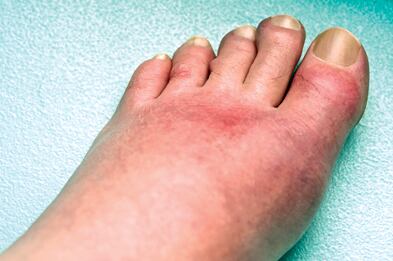In the study, published in the Journal of Functional Foods, supplementation with Montmorency tart cherry concentrate at dose levels of 30 and 60 ml decreased blood levels of uric acid whilst increasing urinary uric acid.
“Put simply, uric acid crystallises in the toes – usually the great toe – and causes excruciating pain – If you can lower uric acid, you might also reduce issues associated with gout,” explained lead researcher Dr Glyn Howatson, from the Department of Sport, Exercise and Rehabilitation at Northumbria University.
Blood levels of hsCRP (high sensitivity C-reactive protein) – a marker for inflammation – were also decreased.
“Systemic inflammation, as indicated by hsCRP, is a clinically accepted marker of whole body inflammation...Here, inflammation was reduced following both doses of the concentrate,” wrote the researchers.
Effect on a par with drugs
They said this corroborated previous work that demonstrated the anti-inflammatory effect of isolated tart cherry anthocyanins as being comparable to commercially available non-steroidal anti-inflammatory drugs (NSAIDs).
“The impact of Montmorency cherry concentrate on inflammation may provide further efficacy for its use in the treatment of inflammatory disorders,” they said.
The study used a tart cherry concentrate from Cherry Active and was sponsored by the Cherry Marketing Institute.
In terms of the next step, Dr Howatson told this publication: “We would particularly like to explore this intervention in a clinical population who have gouty arthritis, but we are also interested in what other physiological effects it may exert.”
Study design
In the current single blind, two-phase, randomised, cross-over study, 12 healthy participants (average age 26) were given two doses of Montmorency tart cherry juice concentrate (30 ml or 60 ml) mixed with 100 ml of water.
There was a washout period of at least 10 days between the phases. Each phase was comprised of two days drinking the tart cherry juice concentrate twice a day – in the morning and just before dinner.
The researchers collected blood and urine samples from the participants immediately before and at numerous intervals for 48 hours after the tart cherry juice was consumed.
The results supported the researchers' hypothesis: Blood levels of uric acid and C-reactive protein were reduced and urinary uric acid was increased following both doses of the tart cherry juice. The magnitude of the change was independent of the dose given; that is, 30 ml of the juice was just as effective as 60 ml.
“Consequently, a 30 ml dose of cherry concentrate was sufficient to modulate indices associated with gout outbreaks,” wrote the researchers.
Anthocyanins responsible?

This work was the first to report the plasma uptake of anthocynanin compounds following Montmorency cherry consumption, which has previously been suggested to be responsible for changes in uric acid metabolism.
The main anthocyanin identified in the tart cherry concentrate was CYA-3-O-glucosiderutinoside. Plasma CYA-3-O-GluRut levels were found to be no different between doses, although the 60 ml dose showed a greater level of absorption in the first hour following supplementation.
The researchers said this suggests that, “despite plasma availability of CYA-3-O-GluRut being higher with a larger dose, the uric acid activity was not affected”.
They said that whilst their work did not refute the suggestion that anthocyanins are responsible for reductions in uric acid, “it seems that there is a finite amount of anthocyanin compounds required to elicit a change”.
In summary the researchers said the results provide rationale for the use of Montmorency cherry concentrate as an adjuvant therapy to NSAIDs in the treatment of gouty arthritis.
“These are the first data to show Montmorency cherry concentrate as an efficacious, adjuvant supplement in managing inflammatory conditions, such as those seen with gout, and those observations are independent of CYA-3-O-GluRut absorption in humans,” they concluded.
Source: Journal of Functional Foods
2014; 11 : 82-90.
“Montmorency tart cherry (Prunus cerasus L.) concentrate lowers uric acid, independent of plasma cyanidin-3-O-glucosiderutinoside”
Authors: Bell PG, Gaze DC, Davison GW, George TW, Scotter MJ, Howatson G.
